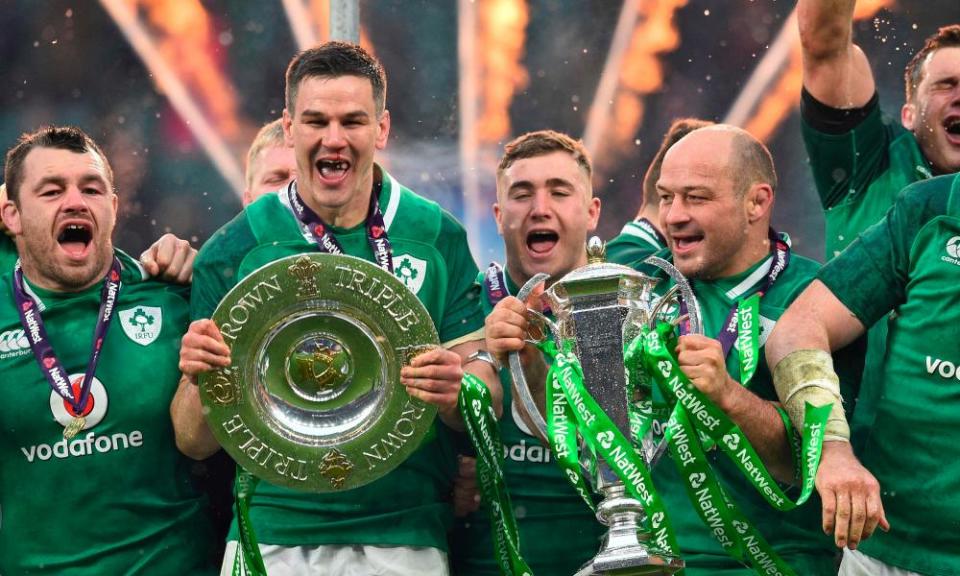Ireland seal grand slam with storming win over England in Six Nations finale

Beware the slides of March. England’s descent continued with a third successive defeat in the sleet as Ireland achieved a third grand slam and their third title in five years. It was the home side’s first defeat here since the 2015 World Cup and their first at home in the Six Nations for six years. They were a distinct second in every aspect of the game.
A hat-trick of defeats on the day of St Patrick beckoned at half-time for an England side that was changed in personnel rather than tempo. Ireland led 21-5 and were on course to trump their biggest win here, by 13 points in 1964. Only France, in 1991, had won the grand slam at the home of English rugby but the champions played as if they were the home side, on the front foot from the off.
They had the benefit of the reviews for their first and third tries. Rob Kearney appeared to knock the ball on five minutes in in a challenge with Anthony Watson before Garry Ringrose grounded it. Jacob Stockdale completed the opening period by taking Conor Murray’s slick pass, kicking into England’s 22 and overtaking Mike Brown before kneeing the ball over the line and touching it down just before it went dead to set a new record of seven tries in a Six Nations campaign.
There was a suggestion the ball had brushed his hand but the try was allowed. England had the benefit of reviews in their victories over Australia and Wales this season and the tries were a reflection of the superiority of Ireland, who were clinically accurate. Much had been made in the build-up about England’s indiscipline at the breakdown this tournament: they only conceded one penalty after a tackle in the opening period, when Kyle Sinckler failed to support his body weight, but their problems had largely been when they were in possession and Ireland had most of the ball.
So much so that the Ireland No 8 CJ Stander carried the ball for the same distance as England’s eight forwards combined in the first half: 32m. Some of them were made for Ireland’s second try after 23 minutes when they worked a move from a line-out, the hands of the prop Tadhg Furlong freeing Bundee Aki who feinted to pass outside him before freeing Stander who took two tacklers with him to the line before touching the ball down on a post.
A year ago, Ireland were motivated by denying England the grand slam in Dublin, which they did for the third time in the Six Nations, but a team defending a six-year unbeaten ground record in the tournament against the side that had seized its championship crown was unable to match the intensity or precision of a side that throughout the tournament has played to its strengths.
Ireland’s first try summed them up. They won a penalty in their own 22 when Owen Farrell tackled Rob Kearney marginally late, kicked to touch, won the line-out and established a position from where Jonathan Sexton tested Watson at full-back with an angled high-kick towards England’s line. As the full-back tracked the ball’s descent, he ended up facing the wrong way and missed the ball under Kearney’s challenge. He could only watch as it bobbled over the line and Ringrose reacted quicker than anyone else.
Ireland were a step ahead throughout. England found a foothold in the game after Peter O’Mahony was sent to the sin-bin for collapsing a maul, Elliot Daly the first to reach Farrell’s chip, and Bundee Aki was fortunate to avoid a yellow card for a high challenge on Daly, but as soon as Ireland were back to their full complement they scored their third try through Stockdale after Murray held the defence and freed the wing with a disguised pass.
The former Ireland coach Matt Williams last week dismissed his former side as boring, but that said more about him than the champions. England have not suddenly become an awful side, but they were made to look not so much ordinary here as peripheral. The home side saw more of the ball in the second period and Daly’s second try on 24 minutes, which followed Conor Murray’s penalty, saw a narrow defence exploited through Mike Brown’s pass out of the back of his left hand.
Brown was on the field for Watson, who rolled his left ankle in the opening half, and Danny Care provided a brief uplift from the bench, but the more England attacked, the more they highlighted how they lacked the accuracy of their opponents and the collective understanding. They finally scored a third try through Jonny May with the final move of the match to deny Ireland a record victory here, but the men in green were already celebrating something far more significant.

 Yahoo Sport
Yahoo Sport 





































